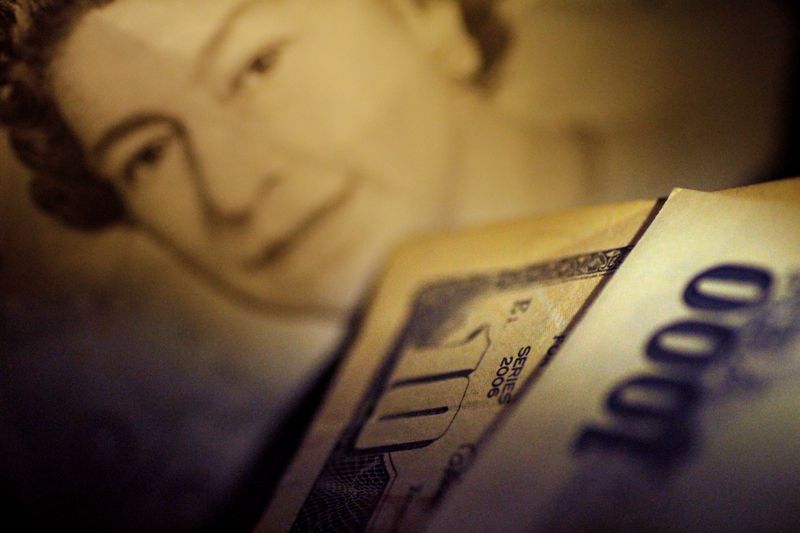By Hideyuki Sano
TOKYO (Reuters) - Safe-haven currencies were on the backfoot on Tuesday as hopes of an economic turnaround boosted riskier assets like the Aussie and yuan, although worries about a blowout in British public spending kept the pound under pressure.
Spurring fresh optimism on the U.S. economy was pending home sales data, which showed that housing market activity had quickly recovered in May from a plunge triggered by the pandemic.
Pending home sales, based on contracts signed last month, surged 44.3%, compared to economists' forecast for 18.9% rise.
Wall Street shares were also buoyed by a 14% surge in Boeing (N:BA) as the embattled aircraft maker began a series of long-delayed flight tests of its redesigned 737 MAX.
The dollar has climbed 0.1% to 107.70 yen
The safe-haven Swiss franc eased to 0.9508 per dollar
The euro stood at $1.1244 (EUR=), having gained a tad against the U.S. currency on Monday.
End-of-quarter corporate repatriation flows appear to be playing a role in latest moves, analysts also said.
"On the whole, the market is cautious," said Minori Uchida, chief currency strategist at MUFG Bank. "Both on the year and compared with late February levels before the pandemic, the four G10 currencies that have current account surpluses -- the yen, Swiss franc, the euro and the Swedish krona -- have strengthened against the dollar."
Sterling traded at $1.2297
"This is the moment for a Rooseveltian approach to the UK," Johnson told Times Radio on Monday, referring to former U.S. President Franklin D. Roosevelt's "New Deal" programme, which included massive public works projects to help the United States recover from the Great Depression.
There are also doubts about whether Britain will seal a trade pact with the European Union as little progress has been made in agreeing on Britain's future relationship with the bloc.
The British currency hit a three-month low against the euro, which rose to as high as 0.9175 pound on Monday. The common currency last stood at 0.9138 pound.
All in all, the dollar index (=USD) was little changed at 97.444. U.S. Federal Reserve Chair Jerome Powell said late on Monday the outlook for the world's biggest economy is "extraordinarily uncertain" and will depend both on containing the coronavirus and on government efforts to support the recovery.
The epidemic showed few signs of abating as Arizona ordered the closure of bars and gyms, joining other sun belt states like Florida and Texas in reversing reopenings.
"The bankruptcy of Cirque de Soleil highlights the fact that the show biz and tourism sector will continue to suffer. The economy is still barely tottering," said Ayako Sera, senior market economist at Sumitomo Mitsui Trust Bank.
The Canadian entertainment group filed for bankruptcy protection on Monday as the pandemic forced the famed circus operator to cancel shows and lay off its artistes.
The Chinese yuan and the Australian dollar gained slightly after a survey showed China's factory activity expanded at a stronger pace in June, beating expectations of slowdown from last month.
The offshore yuan gained 0.15% to 7.0652 per dollar
The market shrugged off news that China's parliament passed national security legislation for Hong Kong. That came after The United States earlier began eliminating Hong Kong's special status under U.S. law.

Graphic: World FX rates in 2020 https://graphics.reuters.com/GLOBAL-CURRENCIES-PERFORMANCE/0100301V041/index.html